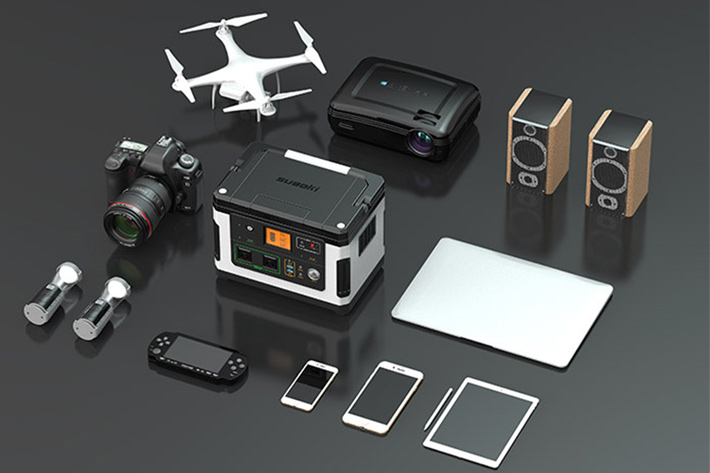
Energy to power a drone for nine hours or a laptop for 45 hours is what Suaoki offers in a power station, G500, that can be recharged three different ways, including solar panels.
Presented, essentially, as a solution for campers, RV’ers, sailing enthusiasts and other outdoor lovers, the Suaoki G500 is, in fact, a product that may appeal to anyone who needs to power different equipment while off-grid. Although this “portable” does not mean you will want to carry it in a backpack – for that Suaoki has other solutions, less powerful – the G500 is a logical choice for anyone in need of more than the USB power banks we all carry these days to charge smartphones. Photographers and videographers may appreciate the options it offers to power different equipment.
Featuring a Li-ion battery offering 500Wh / 137,700mAh capacity, the Suaoki G500 is able to power a Mavic Pro drone for nine hours, a GoPro camera for six hours, a LED light (20W) for some 20 hours, a laptop for 45 hours and a phone for 90 hours. Although there are other solutions in the market in this segment, the G500 offers some extra versatility, with its USB/AC/DC outlets and mega capacity.
In terms of connections, the G500 features a QC3.0 USB-C port so you can charge your type-C devices whenever you want. As the QC3.0 charging protocol is downward compatible you can also charge any USB device you may have. Moreover, the power station also has 2 USB-A fast charge ports for those who are still using the traditional USB-A devices. There are also two direct DC outlets (12V/3A) and a 12V/10A car port for in-car devices like car refrigerator, air compressor, or portable outdoor shower. The Suaoki G500 also has an Anderson PowerPole connector, suggesting one of its interesting features: the ability to use the sun to recharge.
In fact, the Suaoki G500 is entirely solar-chargeable. Combined with the Suaoki 100W Solar Panel (which is included as one of the perks for backers), you’ll have your own personal solar power generator and storage unit. The G500 power station has built-in MPPT controller (Maximum Power Point Tracking Technology) which can increase your solar chargings as much as possible. Suaoki says there are two ways to charge G500 with solar panels: you can use the included MC4 Solar Charging Cable to connect to Anderson Powerpole, or you can also connect solar adapter (6530) to the DC input port. Both ways of charging need no external controller, thanks to the built-in MPPT charge controller.
Using solar energy to recharge the unit is only one of the options. The G500 can also be charged using the cigarette lighter receptacle of your car, while driving, but it should be noted that 12V adapter can not fully charge it, only 24V adapter can. It should be used as a complementary way of charging. Charging via wall outlet, when available, is the fastest way, which takes about 8-10 hours.
The battery management system (BMS) allows the G500 to perform more smartly and safely. Suaoki says that when the internal temperature is higher than 45°C or the total wattage is over 150W, the unit will automatically turn on the cooling fan. It will also automatically shut down if a component heats up too much and the protective chip also prevents overvoltage, overcurrent, and short circuit.
The unit features pure sine wave AC output, making it ideal for CPAP machine users who’d like to go camping every now and then. It can be of great help if a local band concert needs to be held on the beach, because pure sine wave generates less electrical noise in audio equipment and brings more pleasant music.
The G500 is not the first solution from Suaoki when it comes to power suply units. The company has a vision to create power sources that are clean, silent, sustainable, and portable. Back in 2017 the Suaoki was on Indiegogo with a campaign for another power unit, the S270 portable charging station & solar generator, with was 423% funded, and their website features other solutions available you may want to explore.
The G500, presented as the most powerful all-in-one power station is almost funded on Indiegogo.With a $20.000 flexible goal, the campaign has reached close to $15.000 from 32 backers, and there are 15 days to go before it ends. The initial units will only be available in a version suitable for the US (110V) but the company is working on a version for the European market (220V) that will be available soon.
